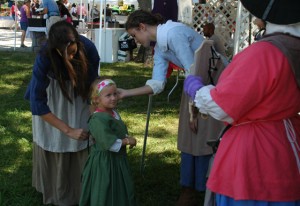“Be brave,” my father would say.
He died thirteen years ago; however his words reverberate beyond death. Lots of messages from the past echo in us: we all carry the spoken and unspoken adages and scripts of our parents. Internalized within us are mantras not of our own making. And the mantras create our personalized family “mythology.” Some of these words we need to live by.
Our parents, our families, if we are fortunate, teach us how to be safe (“Don't put your finger in the light socket.”); how to get along with others (“Share that toy with your brother.”); how to be respectful (“Say please, say thank you.”) And some of these scripted mantras passed on from generation to generation probably arose out of necessity. Can you imagine a 6-year-old bundled in blankets in the middle of winter on a journey across the ocean in 1895, emigrating from Italy or Eastern Europe to America, being told not to be brave? I imagine my ancestors having to be very brave and not cry as they left the familiar and its poverty to forge a new life in the New World where both the landscape and the language were foreign. Not the time for tears; indeed the time to be brave.
However, what was necessary in certain circumstances, becomes a constriction of feeling in others. Another, later era 6-year-old, crying at the death of her puppy in an American town, doesn't need the “be brave” admonition as much as she needs permission to feel her sadness.
Many years ago, during a series of miscarriages followed by a time of infertility, I cried in church on Mother’s Day, when roses were presented to all the women in honor of their “motherhood”. My father happened to be present. He looked at me, my tears streaming, and said, “Be Brave.”
Not being a child any longer, I spoke out. “Why, Dad, so you won't feel my sadness, and be hurt too?” So disarmed, so taken aback, he sputtered, “Well, yes!”
Often, beyond when it is necessary for survival or safety, family messages retain their power to stop authentic feeling. For example, we don't want our child to hurt. (Or we don't want our child to be angry, because we ourselves get afraid of anger, and so on.)
Feelings are neither good or bad—they arise, they are, they need to be acknowledged, accepted. What goes awry with our feeling is not finding healthy expression of them. (One feeling we often have difficulty with is anger. Anger can be a symptom of our experience of an injustice. It can be a warning to us about a situation in which we feel distress. Acting violently against self or others is the unhealthy expression of that feeling.)
When we have awareness of our inner messages/mantras from our families, we have a choice of action. Do those words fit in this situation, or are they constricting our feeling, our aliveness?
Sometimes we do need to be brave. On July 7, 1996, I remember whispering in my father’s ear as he lay dying, “Okay, Dad, now’s the time to be brave.” Despite his almost comatose state, he nodded his head, “Yes.”
? Kayta Curzie Gajdos holds a doctorate in counseling psychology and is in private practice in Chadds Ford, Pennsylvania. She welcomes comments at MindMatters@DrGajdos.com or 610-388-2888. Past columns are posted to http://www.DrGajdos.com/Articles.
About Kayta Gajdos
Dr. Kathleen Curzie Gajdos ("Kayta") is a licensed psychologist (Pennsylvania and Delaware) who has worked with individuals, couples, and families with a spectrum of problems. She has experience and training in the fields of alcohol and drug addictions, hypnosis, family therapy, Jungian theory, Gestalt therapy, EMDR, and bereavement. Dr. Gajdos developed a private practice in the Pittsburgh area, and was affiliated with the Family Therapy Institute of Western Psychiatric Institute and Clinic, having written numerous articles for the Family Therapy Newsletter there. She has published in the American Psychological Association Bulletin, the Family Psychologist, and in the Swedenborgian publications, Chrysalis and The Messenger. Dr. Gajdos has taught at the college level, most recently for West Chester University and Wilmington College, and has served as field faculty for Vermont College of Norwich University the Union Institute's Center for Distance Learning, Cincinnati, Ohio. She has also served as consulting psychologist to the Irene Stacy Community MH/MR Center in Western Pennsylvania where she supervised psychologists in training. Currently active in disaster relief, Dr. Gajdos serves with the American Red Cross and participated in Hurricane Katrina relief efforts as a member of teams from the Department of Health and Human Services' Substance Abuse and Mental Health Services Administration.Now living in Chadds Ford, in the Brandywine Valley of eastern Pennsylvania, Dr. Gajdos combines her private practice working with individuals, couples and families, with leading workshops on such topics as grief and healing, the impact of multigenerational grief and trauma shame, the shadow and self, Women Who Run with the Wolves, motherless daughters, and mediation and relaxation. Each year at Temenos Retreat Center in West Chester, PA she leads a griefs of birthing ritual for those who have suffered losses of procreation (abortions, miscarriages, infertility, etc.); she also holds yearly A Day of Re-Collection at Temenos.Dr. Gajdos holds Master's degrees in both philosophy and clinical psychology and received her Ph.D. in counseling at the University of Pittsburgh. Among her professional affiliations, she includes having been a founding member and board member of the C.G. Jung Educational Center of Pittsburgh, as well as being listed in Who's Who of American Women. Currently, she is a member of the American Psychological Association, The Pennsylvania Psychological Association, the Delaware Psychological Association, the American Family Therapy Academy, The Association for Death Education and Counseling, and the Delaware County Mental Health and Mental Retardation Board. Woven into her professional career are Dr. Gajdos' pursuits of dancing, singing, and writing poetry.
- Web |
- More Posts(250)


Comments